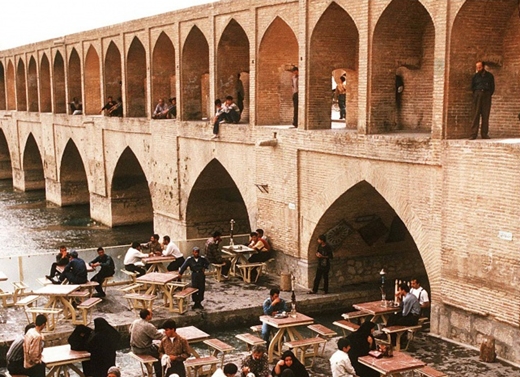In a travel piece written for Paris news magazine L’Obs, Jean-Claude Guillebaud shares his reflections on his recent visits to Iran, where he was shocked at the vast gulf between the media representation of the country and the reality which he found. His viewpoint, which speculates on the reasons for this, was covered by Mehr [in Farsi] and translated from the original French by IFP.
A combination of circumstances allowed me to cross paths with Iran for the second time on my one-year trip from April 2015-April 2016. Again, along with thirty of my compatriots, I felt the same shock. The word shock, though, is an understatement. Astonishment would be better.
The group I accompanied was frankly and deliberately secular. Nobody had the slightest hint of complacency or even indulgence for the Mullahs of the Islamic Republic, who have been in power for about thirty-seven years. As the kilometres rolled by, however, from Tehran to Shiraz, passing through Kashan, Abyaneh, Isfahan, Nain, and Yazd Ardakan – our amazement grew more intense.
All travellers are familiar with that gap between an imagined country and a discovered country. In the case of Iran, the difference is stunning. The number of ways in which this country is misrepresented in the media could make up a book. While a repeated refrain evokes Iran as a country locked in archaism and dictatorship, other nations like Saudi Arabia are far less condemned, despite being suffocated by misogyny, and keeping women under veils and in ignorance.
Despite international sanctions and the embargo that Iran has been suffering from for a long time, this country appears to the visitors as a great one (nearly three times the area of France), sheltering 80 million inhabitants and endowed with some of the best-educated youth of the Middle East. Civil society has learned to be cunning in its interactions with the regime – one might say it has modernized all on its own. Besides, women have never been so numerous in universities and in several professions such as medicine, law, social work, and teaching. Along the way, French members of the group marvelled at the clean modernity of the cities that we passed through (Isfahan has 1.5 million inhabitants and Shiraz a little more), and at the almost European standards of living, as well as the literacy rate.
All this is added, of course, to a courtesy and hospitability which has few rivals. Ancient Persia has left its mark on the cultural refinement of a country where even taxi drivers recite poems by Hafez, Sa’adi or Omar Khayyam. Let’s add to all this a freedom of speech (sound different?) that permits many to proclaim their mistrust towards the regime right in front of us, in a loud, clear voice. This happened to us, for example, in a Shirazi restaurant where we were invited to join a birthday party, and where conversations blazed. Political fearlessness and communal songs made this Franco-Persian party last even longer! The gap between the image of Iran in political media and its Persian reality is staggering, and deserves to be questioned.
So, where does this blindness come from?
Is there still a kind of unacknowledged remnant of the period when, out of hostility to Iran (like the Americans), we supported Saddam Hussein’s Iraq in the dreadful war that killed 750,000 from 1980-88? Is it due to the secular horror that this 1979 religious revolution hasalways inspired in the French? Is there a new explanation? Those in power on the left in France have chosen to be a friend – and a grateful customer – of Saudi Arabia, where people are publically beheaded and the official religion is a Wahhabi Islam which is an ideological “black box” of terrorism.
Despite all of this, however, it is clear that Iranians remain very Francophile. At the peak of the tourist season (I can see twice as many tourist groups and air-conditioned cars than last year), the French people are the most numerous, followed by the Germans and Italians. Paradoxically Iran, which has been denigrated for so long, is now becoming a trendy destination for Europeans. Now, they are waiting for the Americans! Fifty 5-star hotels are planned to be built in the coming year! This is a new “invasion,” carrying a different threat for this land of poets…
